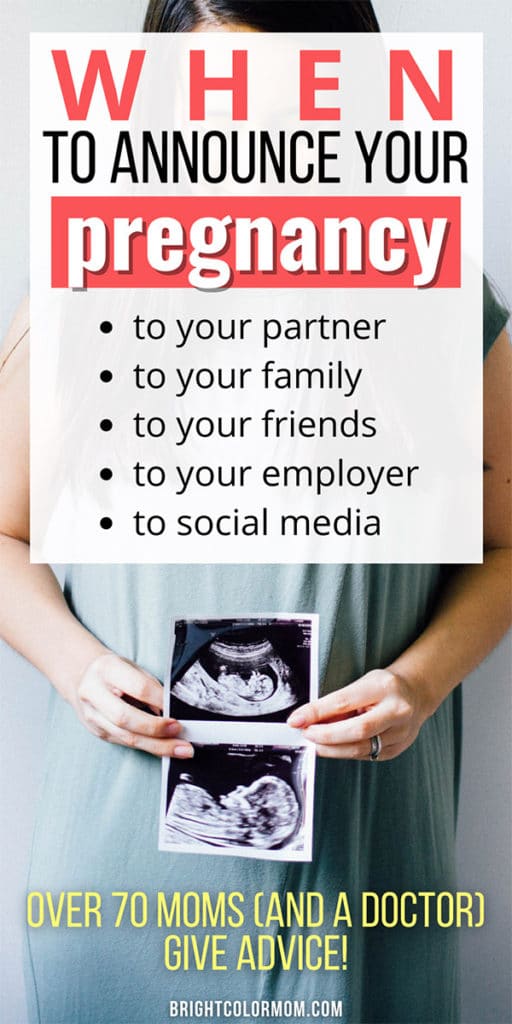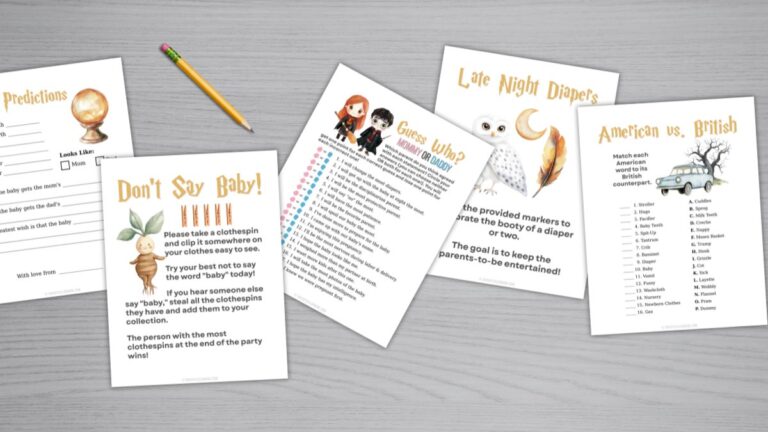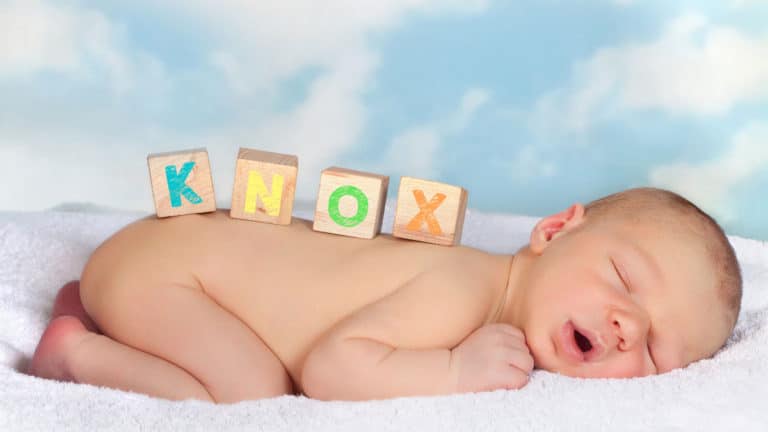The test is glaringly positive, and you’re filled with excitement and want to tell your family and friends you’re pregnant! Right? I know I was. But as a first-time mom, I had no idea when to announce pregnancy. Is there a safe time? What is the risk of miscarriage, anyway?
I’ve been through two pregnancies (and announcing each of them to everyone in my life), so I have learned all of the dos and don’ts about making a pregnancy announcement. My husband and I even experienced waiting until 20 weeks to announce pregnancy with our second child!
In addition to my experience, I’ve also talked with dozens of women about the circumstances surrounding when they chose to announce their pregnancies. They’ve graciously allowed me to share their stories with you. I also got to speak with Dr. Vonne Jones, a practicing OBGYN of Total Women’s Care in Houston, TX. She explains why she believes waiting to tell everyone is best – with the exception of one very important person.
So, when do you announce pregnancy? The truth is, there is no wrong time. It’s not illegal to announce your pregnancy right away, or even wait until after your baby is born! Of course, there are some general socially-accepted guidelines for announcing your pregnancy. It’s also worth noting that these unspoken rules are currently evolving, and we’ll discuss the reasons why with the help of a mom who has experienced several miscarriages.
When Other People Announce Pregnancy
Before I go telling you about all of the “rules” and recommendations regarding when to announce pregnancy, why don’t we take a look at when real women tend to announce their pregnancies? After all, just because guides exist doesn’t mean we like to follow them. Knowing when other women prefer to announce their pregnancies can help you feel better about your decisions on when to tell everyone. It’s nice to know you’re not the only one breaking the rules!
I spoke with over 70 English-speaking moms who discussed 133 pregnancies with me! For the sake of simplicity, I’m going to discuss only when they decided to make their final announcements to everyone. These results generally indicate when they chose to announce their pregnancies on social media or were no longer trying to keep it a secret in their day-to-day-lives.
When Real Women Announced Their Pregnancies to Everyone
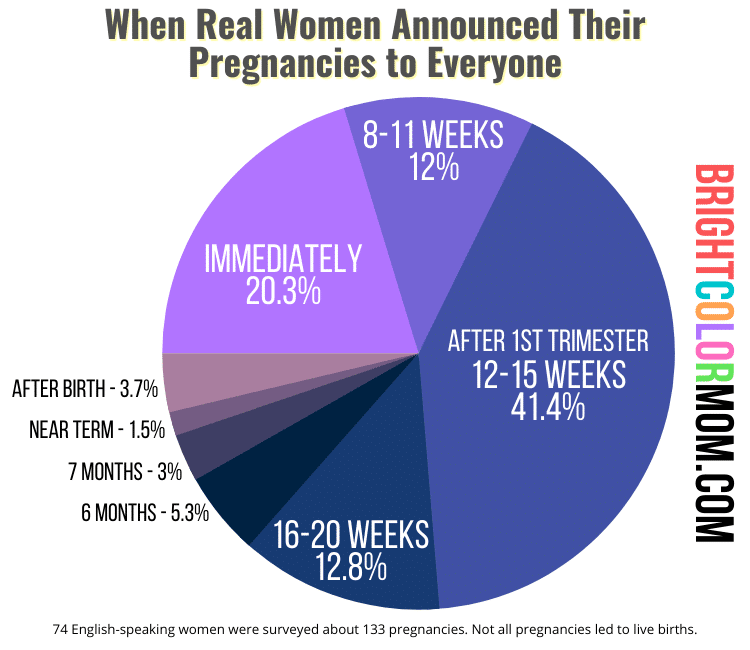
| How Far Along They Were | % of Women Who Announced |
|---|---|
| Immediately: | 20.3% |
| 8-11 Weeks: | 12% |
| 12-15 Weeks: | 41.4% |
| 16-20 Weeks: | 12.8% |
| 6 Months: | 5.3% |
| 7 Months: | 3% |
| Near Term: | 1.5% |
| After Birth: | 3.7% |
You might be able to guess that the largest percentage of pregnancy announcements occurred after the recommended “safe” period of 12-13 weeks had passed. It’s also understandable that the second largest group were the women who announced their pregnancies right away. Excitement makes it really hard to hold it in!
What absolutely shocked me, though, were the number of women who kept their pregnancies a secret until they were nearly due or had ALREADY had their babies! I think it’s pretty cool they were able to pull it off, to be honest.
Keeping these real-life numbers in mind, let’s discuss some of the factors involved in deciding whether or not you might want to wait to announce your pregnancy.
The Risks for Your Pregnancy
There are a lot of different things that can land a pregnancy in the “high-risk” category. For me, just being obese earned me that label. You can also be high-risk if you get pregnant later in life, have already experienced pregnancy loss, continue frequent smoking, have high blood pressure, are carrying multiples, and more.
10%-20% of all known pregnancies end in miscarriage. The real number is likely higher due to pregnancies lost before women even know they’re pregnant.
While that is a heartbreakingly high percentage, it can also be comforting to know that if you experience pregnancy loss, you’re definitely not alone. There’s one major risk of miscarriage that is difficult to talk about, but let’s discuss why it can predict a possible pregnancy loss better than many other factors.
A History of Miscarriage
If you’ve had a single miscarriage, your risk for another remains the same as any other woman who’s never had one before. However, once you’ve had two miscarriages, your risk elevates to 28%. After three (or more) losses, your risk of miscarriage remains at about 43%.
“The miscarriage was painful enough, but every time I had to tell someone else what had happened brought all of the pain back up. I really feel like it made it harder to recover and move on emotionally,” says Candice of Little Steps, Big Happy. After losing her first pregnancy, she waited until the end of her first trimester to announce her next three pregnancies to everyone. Fortunately, they all ended with healthy babies.
Nikki of Nikki Blogs had a healthy first pregnancy but went through some heartbreak after that. “After my second and third pregnancies both ended in miscarriages, I decided to wait until near the end of my second trimester to announce my fourth pregnancy.” Her fourth pregnancy did lead to a healthy newborn.
When to announce pregnancy after miscarriage is a really personal decision, and many women are overly cautious, like Nikki. You have to decide if you’re willing to explain a loss (or multiple losses) to the people you want to announce your pregnancies to early on.
When to Tell People You Are Pregnant
Risk factors aside, when should you announce your pregnancy under normal circumstances? Sometimes in successive pregnancies, your body doesn’t give you the option of waiting to tell! Samantha of Evidence-Based Mommy says, “By the third and fourth children, I showed too quickly to keep it secret long! I had someone stop to congratulate me when I was only 7 weeks [pregnant] with my last child.” But if it’s your first pregnancy, you might not even know the traditional timeline yet. So let’s discuss it!
When is it safe to announce pregnancy?
While many first-time moms never really think about the possibility of loss, others want to know right away when it is OK to announce pregnancy with minimal risk. Even if your family already knows you’re pregnant, telling everyone on your Facebook list is a completely different story. Marissa of Just Simply Mom hits the nail on the head: “It’s a lot tougher to announce to the public that you miscarried rather than just a few close friends and family.”
Why is 12 weeks safe to announce pregnancy?
You’ve probably already heard that you’ll be in the clear after the first trimester. Dr. Vonne Jones states the most common reason for waiting until after you’re 12 weeks pregnant to announce a pregnancy: “During the first 13 weeks is going to be when the risk of miscarriage is going to be the highest… After that, typically the risk of miscarriage in the second trimester is going to be between 1% and 5%.”
I researched some real data on the likelihood of miscarriage based on your age and how far along you are, and the numbers support Dr. Jones.
Risk of Miscarriage by Weeks of Gestation
| Weeks Gestation | Risk of Miscarriage |
|---|---|
| 5 Weeks: | 21.3% |
| 6-7 Weeks: | 5% |
| 8-13 Weeks: | 2%-4% |
| 14-20 Weeks: | Less than 1% |
This table illustrates why most women wait until after the first trimester to announce their pregnancies. While the risk of miscarriage never drops to zero, less than 1% is as good as it gets.
Risk of Miscarriage by Maternal Age
| Age at Conception | Risk of Miscarriage |
|---|---|
| 12-19 Years Old: | 10.8% |
| 20-24 Years Old: | 9% |
| 25-29 Years Old: | 9.7% |
| 30-34 Years Old: | 12.4% |
| 35-39 Years Old: | 20.7% |
| 40-44 Years Old: | 43.7% |
| Over 45 Years Old: | 81.3% |
As you can see, the older you are, the more likely you are to miscarry. Getting pregnant over 40 carries an enormous amount of risk.
Do YOU need to wait until 13 weeks to announce your pregnancy?
A mother named Rachel disagrees with waiting to announce a pregnancy – even after experiencing five losses herself. “There is no such thing as a ‘safe’ time to tell. Pregnancy comes with no guarantees. Announcing early ensured I got the support I needed as I went through the many challenges of a high-risk pregnancy after loss. It also meant that if I walked through another loss, I wouldn’t be walking through it alone.”
Rachel believes encouraging women not to tell in the first 12 weeks is just a way to protect the community from discomfort at the expense of the individual. “If we are working to break down stigmas around women’s fertility, why do we perpetuate a myth of safe pregnancy when that doesn’t serve women — it only shames them when they experience loss?”
While it’s difficult for some women to share their losses, others who need support feel obligated to keep early losses to themselves. Deciding whether you’d prefer privacy or support can help you determine when you can “safely” announce your pregnancy. Let’s discuss some other factors to consider before you make your decision.
Severe Morning Sickness
Whether or not you’re a working woman may impact the choice of when to make a pregnancy announcement. Extreme morning sickness can, in many cases, make it almost necessary. Otherwise, you may experience criticism or misdirected concern about your health from your coworkers.
Even if you’re not comfortable telling your entire workplace you’re pregnant yet, it may be wise to tell your boss in the case of constant vomiting. They’ll know you’re not frequenting the restroom to dodge work, and they can help assure your teammates that you’re not contagious.
If your morning sickness is so severe you’re unable to work, such as in the case of hyperemesis gravidarum, you’ll have to tell your employer to discuss the possibility of medical leave until it gets under control.
Scheduled Travel
Kryz Uy had to tell some friends sooner than anticipated for this reason. “[T]hey wanted to book tickets to Korea with me, and I did not want to travel while I was in my first trimester. So I ended up telling my friends through a phone call.” On the bright side, her friends’ reactions made her even more excited about the pregnancy.
If you’ve already booked a trip that’s set to occur while you’re in your third trimester, you’ll need to tell your travel agent and anyone you were meant to travel with right away. Waiting will only make changing or cancelling your plans more difficult and expensive.
Your Cultural Traditions
Fellow mom Rhoda was born into Akan culture, where announcing pregnancy at all before childbirth is severely frowned upon. “We’re actually encouraged to keep a lot of things private including our struggle with infertility which is still incredibly taboo and associated with some sort of supernatural curse.”
However, Rhoda, who has experienced several miscarriages in her journey to conceive, has decided to break with tradition. She declares, “My journey is nothing to be ashamed of ESPECIALLY if sharing my story can help one person feel less alone or defeated.” Her rainbow baby is due in July!
You may or may not already be prepared to deal with any backlash related to announcing your pregnancy early in your community. Either way, it’s something to consider. Announcing an early pregnancy can even be triggering for those close to you who have experienced pregnancy loss themselves. It can be difficult to navigate your needs and happiness against other people’s.
Your First Prenatal Appointment
While she assumes expecting mothers tell their partners right away, Dr. Jones cautions women against telling anyone else about the pregnancy until their “confirmation visit,” which is at around eight weeks of pregnancy in her office. She also explains why coming in earlier probably won’t ease your fears about announcing.
“In order for us to actually see the pregnancy, it’s going to be recommended that you wait until that eight-week timeframe at least. Waiting until that time will allow us to get a heartbeat since sometimes it doesn’t start until the end of the six weeks. If you come in earlier, such as at four or five weeks, then it creates anxiety since you’re not able to see and visualize everything.”
Genetic Screenings and Anatomy Scans
If you’ve had your eight-week confirmation, is 9 weeks too early to tell family? Is 10 weeks safe to announce pregnancy? After all, it’s close to the end of the first trimester, right? Well, there’s one other appointment you might want to hold out for, and that’s the genetic screening and/or anatomy scan (they sometimes occur at different appointments). Blood tests can be done to detect certain anomalies. Your anatomy scan can also tell you if your baby has any deformities or syndromes.
For many people, the outcomes of these tests don’t matter – they’re going to have their baby and love them no matter what. For others, devastating results may lead to the decision to terminate the pregnancy. This is especially so in the case of disorders that would lead to a short, painful life for their child.
The results of these screenings may not be available until 16 weeks or later. Many offices won’t do an anatomy scan until 20 weeks, when they can get a better look and confidently determine the sex of the baby.
Announcing Pregnancy After IVF
Women conceiving through IVF have often struggled to get pregnant. You’d think they would be particularly wary to announce their pregnancies, but the opposite is often true! “Even though we knew we should wait to announce just in case something went wrong, we couldn’t hold it in,” says Cady, whose daughter conceived via IVF is now 11.
When you’ve waited so long to get pregnant, it can feel like you’ll burst if you hold in the good news. As far as the risk of loss after successful IVF, it’s the same as it is for women who conceive naturally. There’s no need to worry any extra because of your method of conception!
When to Announce Twin Pregnancy
While having multiples is a risk factor for an increase chance of miscarriage, it’s only slightly higher when having twins. It’s more common to experience a “vanishing twin” than to lose both babies. If you’re really eager to announce your pregnancy early, you can always keep it at that. There’s nothing wrong with waiting to say you’re having twins until later on.
On the flip side, one study shows that once heartbeats are confirmed in both twins, you actually have a decreased risk of miscarriage compared to women at the same stage carrying only one baby!
There is No Strict Rule
We’ve covered a lot regarding the risks of miscarriage, which is the main reason women wait to announce pregnancy. At the end of the day, you should do what feels right! There is no forced rule you must adhere to.
You can tell those closest to you right away, then wait until the end of your first trimester to tell everyone else. This was the path I took with my first pregnancy, though I was worried I would lose my daughter when we decided to tell our parents at Christmas and I was only six weeks along.
You can wait until you’re 20 weeks along and already know the sex of your baby. That’s exactly what I did with my second pregnancy!
You can wait until you’re showing and people start asking. Or tell people right away to ease your anxiety about announcing and share your excitement. You don’t have to keep a miscarriage a secret or avoid talking about it if it happens. If the thought of that makes you uncomfortable, you can keep your special secret until you feel comfortable sharing.
If you’re worried about miscarriage but desperately want to talk about your pregnancy, I strongly recommend you ask your doctor to recommend therapy or community groups for pregnant women. They are strangers, but they also know what you are going through and can lend as much or as little support as you need. Find online communities where you can be private or anonymous to “yell out loud” that you are PREGNANT!
Pros of Waiting to Announce Pregnancy
✔ You and your partner can bond over the secrecy
✔ If unplanned, it gives you time to get excited
✔ Avoiding constant questions about the pregnancy
✔ You will know your baby is healthy
✔ You might have a sonogram picture to show
✔ There’s an extremely low risk of losing your baby
✔ If pregnancy loss occurs, you don’t have to relive it over and over
✔ You could know the sex of the baby already
✔ You will have total control over who knows
Marcia of Family Tango found that last point funny, though. “I didn’t need to tell a lot of people about pregnancy. My mom and my co-worker shared the news with other people.”
Cons of Waiting to Announce Pregnancy
✖ You won’t have a support system yet
✖ Keeping a secret can be stressful
✖ Your job won’t know to limit things like heavy lifting or chemical exposure
✖ People may find out from someone other than you
✖ No one will sympathize as much for your symptoms
✖ Some family members or close friends may be angry you waited
✖ If loss does occur shortly after announcing, it can feel more devastating
When to Announce Pregnancy to Family
If you just missed your period and had a positive pregnancy test, you’re about 4 weeks pregnant. Should you tell your family? Well, at least one person should probably be told. But not everyone needs to know you’re pregnant at once.
Carefully choosing the order in which you announce to people in your life can help strengthen relationships with those you choose to tell first. It lets them know they are important and special to you! Let’s break down a standard timeline for announcing your pregnancy to specific individuals.
When to Announce Pregnancy to Husband or Partner
Often, you don’t have to think much about announcing to your partner you’re pregnant. “My husband knew immediately because he was with me when I took my pregnancy test,” says Jacqueline of Parent Portfolio. But many women choose to take that first pregnancy test alone, either out of impatience, a desire for privacy, or to plan a big reveal.
Anna hit her husband with a doozy when she found out she was pregnant with their second child the same day as his hip surgery. “I hadn’t planned on telling him, but they had to X-ray his hip [for surgery] and he was afraid it would affect his ability to conceive so I told him to calm him down. It didn’t calm him down!”
While you may want to avoid telling your partner right before, say, a big company speech they have to give, they are the one person I strongly recommend telling as soon as possible. After all, once the baby is born, they will be affected by the change almost as much as you are! Not to mention, they are probably the best person available to lend you emotional support in the beginning.
Dr. Jones agrees. “If you’re in a relationship with [your] partner, you will share the news right away.” And even if you’re not on great terms with the father, he should be made aware he helped create a new life if you plan on keeping the baby. It’s just a courtesy!
When to Tell Immediate Family About Pregnancy
Mychelle from Working Moms Tribe has had four children and has always announced her pregnancies to close family right away. Out of concern, her sister-in-law cautioned her against sharing the news so early. Though she knew the concern was well-intentioned, Mychelle saw things differently.
“I explained to her that I chose to be happy and excited about it until I had a reason not to be. In the unfortunate event that one of my pregnancies resulted in miscarriage, I would have been devastated and I would have needed that same circle of friends and family to help see me through it. I understand others are more private and prefer to keep such matters private.”
When to Tell Your Parents You’re Pregnant
I tend to agree with Mychelle. While my husband and I had a couple of weeks during my first pregnancy where only the two of us knew the big secret, I was eager to tell our immediate families (particularly my mom and sister). I had a lot of questions to ask, and I trusted their wisdom and experience.
If you’re not very close to your parents or siblings, however, when to announce pregnancy to your parents and immediate family may fall closer to the same time you tell friends and coworkers. This is especially true if you don’t trust your family to keep it a secret from those you haven’t told.
When to Announce Pregnancy to Kids
Alexandra at Upparent ended up having her kids set their own guidelines over the course of her five pregnancies. “We did have one pregnancy end in miscarriage, just after we had shared the news with our children and parents… It was a difficult experience for our kids, who requested that we wait to tell them until we were further along in any future pregnancies.”
No matter how old your other children are, dealing with a pregnancy loss can be even harder on them than it is on you. Younger ones may not even understand why the baby is no longer coming, and continue to ask questions about it for a long time.
For very young children (under six years old), I recommend waiting to tell them until after you announce it to other close family members. And you don’t even need to “announce” it to them at all. Just casually work into daily conversations the idea that they will soon have a baby brother or sister, and eventually they will become excited.
For older children, I recommend telling them just before the rest of your immediate family. If you wait until later or do it at the same time, they may feel left out or betrayed that they didn’t know first. If you’re worried they wouldn’t cope well with a pregnancy loss after the announcement, I would just push back the timeline on telling your close family until you feel comfortable telling your older children.
When to Tell Work You’re Pregnant
When to announce your pregnancy at work can be tricky. Even though you may want to wait as long as possible to reduce the risk of discussing a miscarriage at work, there are many reasons your employer should know sooner rather than later. The logistics of your job can make it difficult to keep a pregnancy under wraps, like it was for Krissy. “We had some work trips coming up and I was dealing with morning sickness. I opted out of the work trips and felt I needed to tell them the reason why.”
Informing your employer helps protect you from being discriminated against for being pregnant. They have to reasonably accommodate your condition. This could mean limiting any physical labor required of you or moving you to a new department if your current one involves chemicals or practices that could be dangerous to your unborn baby. If you suffer from morning sickness or any other pregnancy-related issues, their knowledge of the pregnancy will be to your benefit. Your employer also needs to prepare for your time off after giving birth.
Explicitly Ask Your Boss or HR for Privacy
Telling your employer early on doesn’t mean you have to announce your pregnancy to all of your coworkers right away. Just tell your boss you’re not ready for everyone to know, and they should use the proper discretion. You also don’t even have to tell your manager or supervisor first; you can go straight to your Human Resources manager if you feel safer and more comfortable with them. (They are also eager to not get the company sued, and will make sure you don’t feel discriminated against by the manager.)
Kassie, founder of Talk 2 Me Mama, was worried about telling her employer because she’d just started her job and thought she might end up a stay-at-home mom. She was worried her coworkers would feel she was a burden or not worth the time to train. That turned out not to be the case at all! After having her baby, the company allowed her to become a PRN (as-needed nurse) so she can work fewer hours while caring for her child. “It’s the best outcome I could have asked for!”
When to Announce Pregnancy on Social Media/Facebook
Berry Dakara had a close call after waiting until she was 6 months pregnant to share on social media! “I almost regretted sharing when a few days later, I was admitted to the hospital for 2 weeks because of the threat of early labor” (her baby was safely delivered at 35 weeks).
While no one likes to think about things going wrong at any point in their pregnancy, Miranda of Adrian’s Elephant can tell you this: “There really is NO safe zone in pregnancy.” Miranda lost her first child in a stillbirth at term, after waiting till 37 weeks to announce her pregnancy on Facebook.
The experience didn’t cause her to close up about her next pregnancy, though. In fact, nearly the opposite happened! “I purchased things for my second child pretty much immediately [after getting pregnant], and I did maternity photos at only 18 weeks. I used these photos to make a formal Facebook announcement again at 20 weeks. All of this was important to me; I needed to celebrate every moment precisely because I knew how easily things could change.”
Fortunately, Miranda’s rainbow baby gave her a happy ending. “My second child was born healthy at 37 weeks… Even had I lost her in pregnancy, I would not have changed a thing about choosing to announce and celebrate. I know from experience that the death of a child doesn’t stop them from being my everything.”
Tell Everyone Important to You First
Once their closest family members know, many people jump straight to social media for their BIG announcement. But I caution you to take a moment to think before you do this! Keep in mind that not everyone on the planet uses social media, let alone on a daily basis. Make a list of any other family or friends that are closest to you that you would 100% want to know you are pregnant before your mailman or old high school science teacher do.
Reach out to each one individually by phone or send a pregnancy announcement in the mail to share the good news! Let them know they are important to you. They might be devastated to log onto Facebook two days later and realize everyone already knows but them.
The Best Time to Announce for You
One thing is for sure: all women have their own unique preferences for when to announce pregnancy. If it’s your first one, how do you decide what’s right for you? Ask yourself a few questions:
- Will telling people make me feel good, or stressed?
- Will keeping it a secret be exciting, or give me anxiety?
- Are there factors in my life that make announcing early more important?
- Is my pregnancy high-risk?
- Do I want everyone to know if I lose my unborn baby?
- Can I handle explaining a loss multiple times?
Fellow mother Hope says it best: “The most important thing is to do it when you’re ready.”
When to Announce Pregnancy: A Timeline
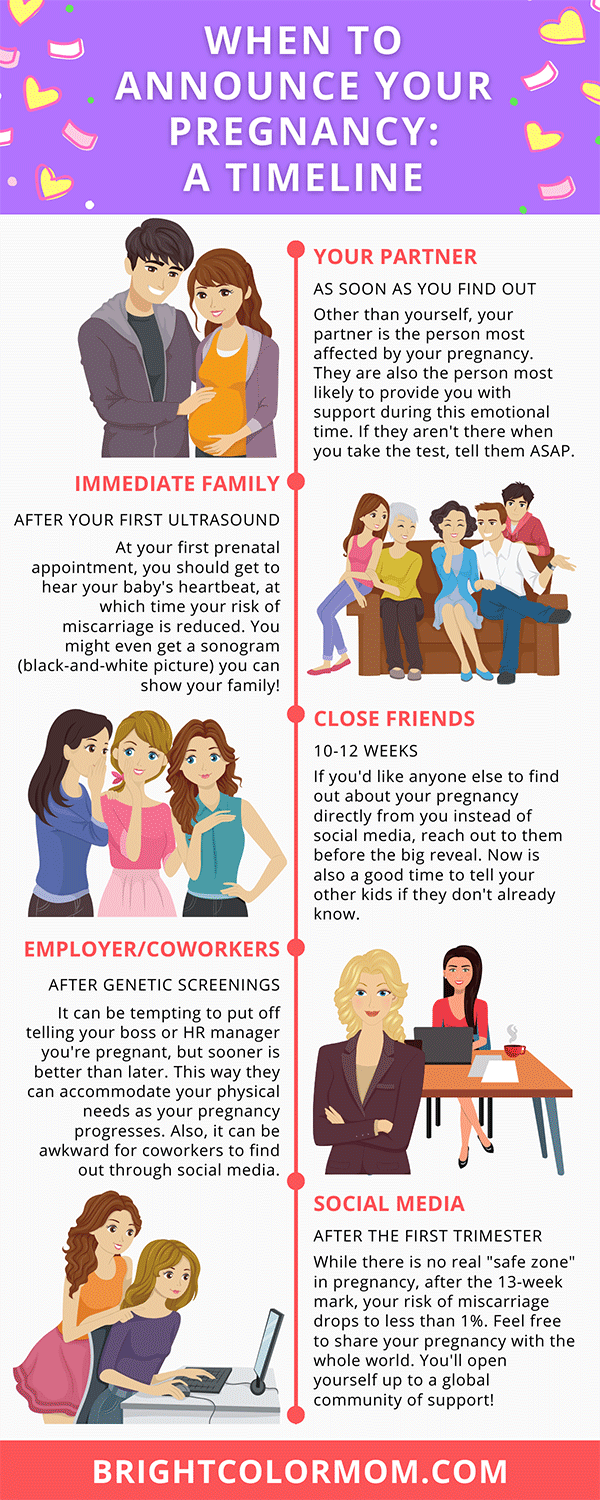
Ideas for Announcing Your Pregnancy
Once you’ve decided when to announce pregnancy, the next step is deciding how! We’ve put together lots of resources to give you great ideas.


